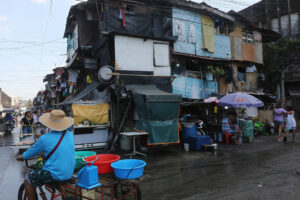




Inflation Update: Green light for easing
 DOWNLOAD
DOWNLOAD

December Economic Update: One for them, one for us
 DOWNLOAD
DOWNLOAD

Philippines Trade Update: Trade trajectories trend along
 DOWNLOAD
DOWNLOAD


Marcos told to get real as he delivers address in his 3rd year

Arthur Ugbaniel, a 29-year-old professional who studied to become a chef, has been operating a motorcycle taxi for about a year now, having failed to find a job that pays well.
“This is just temporary,” the former call center agent said in an interview while dropping off a passenger in front of a bus station along the EDSA highway near the Philippine capital. “I’m planning to work overseas — maybe Japan — where I can get a competitive salary.”
The Philippines, which is largely an agricultural nation, has failed to use its vast natural resources to build a solid manufacturing base, which economists said is key to its long-term growth.
Ferdinand R. Marcos, Jr., who is now in his third year as President and will deliver his State of the Nation Address (SONA) before Congress today (July 22), had promised to boost the agriculture sector and marshal investments for manufacturing, which employs only 8% of the country’s workforce.
In May, he vowed to make the Philippines a hub for smart manufacturing, citing its “geopolitical location, economic engagements and participation in regional agreements.”
 The government of Mr. Marcos, whose campaign was centered on a promise of unity and a vow to bring the price of rice to P20 a kilo, targets 6.5-8% economic growth through 2028, while reducing the poverty rate to as low as 8%.
The government of Mr. Marcos, whose campaign was centered on a promise of unity and a vow to bring the price of rice to P20 a kilo, targets 6.5-8% economic growth through 2028, while reducing the poverty rate to as low as 8%.
These targets are unrealistic, Jesus Felipe, director of the Angelo King Institute for Economic and Business Studies at De La Salle University, said in an e-mail, while faulting the Philippine leader for his populist stance.
The only way to achieve these targets is by pursuing industrialization, which does not seem to be a government priority, he added.
“Perhaps the biggest problem the administration faces is that it started with overly optimistic forecasts for 2023-2028 about growth, income per capita and poverty reduction,” Mr. Felipe said. “They were and still are no more than a wish list.”
“When one listens to the President or members of the Cabinet, one gets the impression that they are talking about Switzerland, one of the richest countries in the world,” he said.
Presidential Communications Office Secretary Cheloy Velicaria-Garafil did not immediately reply to a Viber message seeking comment.
The World Bank reported the country’s gross national income per capita increased by 7% to $4,230 in 2023, but Mr. Felipe noted that around 80% of Filipinos earn PHP 15,000 a month. “Over 50% of the labor force, or 25 million workers, are employed in agriculture, wholesale and retail trade, and construction at very low wages and productivity. With this employment structure, it is impossible to talk about the Fourth Industrial Revolution or Artificial Intelligence as the future of the country.”
Mr. Marcos has gone on more than 20 foreign trips since 2022 — 11 last year and three so far this year — to attract investments.
“His traveling all over the world to attract foreign direct investments is bearing more fruit in actual interests being shown, especially by Japanese, South Korean, and European investors in various infrastructure projects, renewable energy and large-scale agribusiness ventures,” said Bernardo M. Villegas, an economist and professor emeritus at the University of Asia and the Pacific.
But bureaucratic red tape that discourages both local and foreign investments remains a problem, he said.
Data from the Philippine central bank showed foreign direct investments (FDIs) fell by 36.9% to USD 556 million in April from a year earlier, the lowest in 10 months. In the January-April period, FDI net inflows jumped by 18.7% to USD 3.525 billion.
‘HIGHEST PRIORITY’
Mr. Villegas said the Marcos government is on the right track in addressing food insecurity and inflation, which hit 3.7% in June from 3.9% in May and 5.4% a year ago.
Inflation-adjusted wages were 17.5% to 24.6% lower than daily minimum wages across the country, according to a BusinessWorld Research in June.
Mr. Villegas said the Marcos government has given the “highest priority” to food inflation, which quickened to 6.5% in June from 6.1% a month earlier, by cutting tariff rates for key farm products including rice.
“He has recognized the harsh reality that there are some food items in which we do not have comparative advantage of producing and which have to be imported, despite objections from our farmers,” he said.
Executive Order No. 62, which is being challenged by farmer’s groups at the Supreme Court, slashed tariffs on rice imports to 15% from 35% until 2028 as part of a reduced tariff regime for other farm products such as pork and corn.
“Aside from international travels, we saw the initiative to push Charter change as an economic strategy to attract investments when clearly, there are more important policies and issues the government should focus on,” Cielo D. Magno, a professor at the University of the Philippines School of Economics, said in an e-mail.
Ms. Magno, who served as Finance undersecretary under Mr. Marcos, criticized Finance Secretary Ralph G. Recto’s declaration that no new taxes would be collected.
“It’s founded on political interests,” she said, noting that before Mr. Recto took over in December, the Finance department had endorsed higher sin and mining taxes.
Ms. Magno, who resigned from the Marcos Cabinet last year after the President imposed a price cap on rice amid spiraling prices, said the failure to manage spending would lead to higher deficits and debt.
The government has also poorly managed the country’s human capital, with no clear direction for the future workforce, she added.
Filipino students were among the world’s weakest in math, reading, and science, according to the 2022 Program for International Student Assessment (PISA). The Philippines ranked 77th out of 81 countries and performed worse than the global average in all categories.
Citing the 2022 report, the Organization for Economic Cooperation and Development said 15-year-old Filipino students ranked 63rd out of 64 countries in terms of creative thinking.
Priority bills that seek to fix the deteriorating quality of Philippine education and harmonize enterprise-based education and training programs are pending in both Houses of Congress and are targeted for approval before the end of the 19th Congress in June 2025.
Critics have said the Education department had been highly politicized after Mr. Marcos appointed Vice-President Sara Duterte-Carpio, his running mate in 2022, to the post.
Ms. Carpio resigned from the Cabinet last month amid worsening ties between her family and the Marcos camp.
Mr. Marcos’ third year in office is not expected to be easy amid a gloomy outlook for household spending, which grew by 4.6% in the first quarter, slower than 5.3% in the fourth quarter and 6.4% a year ago. It was the slowest pace seen since the 4.8% decline in the first quarter of 2021 amid a coronavirus pandemic.
But his foreign policy appears to be a bright spot amid the growing threat from China, which claims the South China Sea almost in its entirety including waters within the Philippines’ exclusive economic zone (EEZ).
Randy P. Tuaño, dean of the Ateneo de Manila University School of Government, praised the President’s political pivot away from China to its western allies including the US.
“The President’s performance in terms of dealing with foreign relations and external threats is relatively commendable,” he said in an e-mail.
“We have again reestablished our ties with our traditional allies in Asia and in the world, and we have stood up relatively well to threats to our national sovereignty in the West Philippine Sea,” he added, referring to areas of the South China Sea within the Philippines’ EEZ.
‘SENSE OF REALITY’
Six of 10 Filipinos were satisfied with the state’s handling of the sea dispute with China, according to a Social Weather Stations (SWS) poll conducted days after a June 17 standoff at Second Thomas Shoal.
“While efforts in addressing our national security issues and building an improved business environment are worthy goals, unfortunately, addressing institutional and bureaucratic issues, which are important to improve the delivery of public services, still needs significant attention,” Mr. Tuaño said.
“The bureaucratic rightsizing project has not yet taken off and most government departments are still very much top-heavy, with numerous undersecretaries and assistant secretaries in place,” he said. “Efforts to strengthen the use of information and communications technology in the delivery of services needs to be addressed.”
Hansley A. Juliano, who teaches politics at Ateneo, expects Mr. Marcos to become even more populist amid his declining approval and trust ratings, which fell by 2 points and 5 points to 53% and 52% in the latest Pulse Asia Research, Inc. poll.
He will probably focus on handouts such as cash and food aid rather than build houses and schools, which may take years to finish, he said in a Facebook Messenger chat.
Jan Robert R. Go, a political science professor at the University of the Philippines, said the government needs to innovate and shun a “business as usual” attitude in running its affairs.
Mr. Villegas said Mr. Marcos must increase the country’s savings rate to make long-term capital available for long-gestating projects.
“The government budgets for public education and public health should be increased to match those of the other ASEAN (Association of Southeast Asian Nations) countries in terms of percentage to GDP (gross domestic product) from 3% to at least 6%,” he said.
“There should also be more determined efforts to uproot corruption in the procurement of government supplies and in the implementation of public work projects,” he added.
Ms. Magno said the President in his third SONA should rally Congress to boost industries and take a stand against offshore gambling firms, which authorities have linked to crimes.
“We don’t hear anything on industrial policy from the President,” she said. “It’s not enough to travel to attract investments and boost the economy.”
Mr. Felipe said the President should “bring a sense of reality” to the SONA and avoid creating false expectations. “The country will continue doing moderately well, but not [at the level] the government claims.”
This article originally appeared on bworldonline.com





 By BusinessWorld
By BusinessWorld
